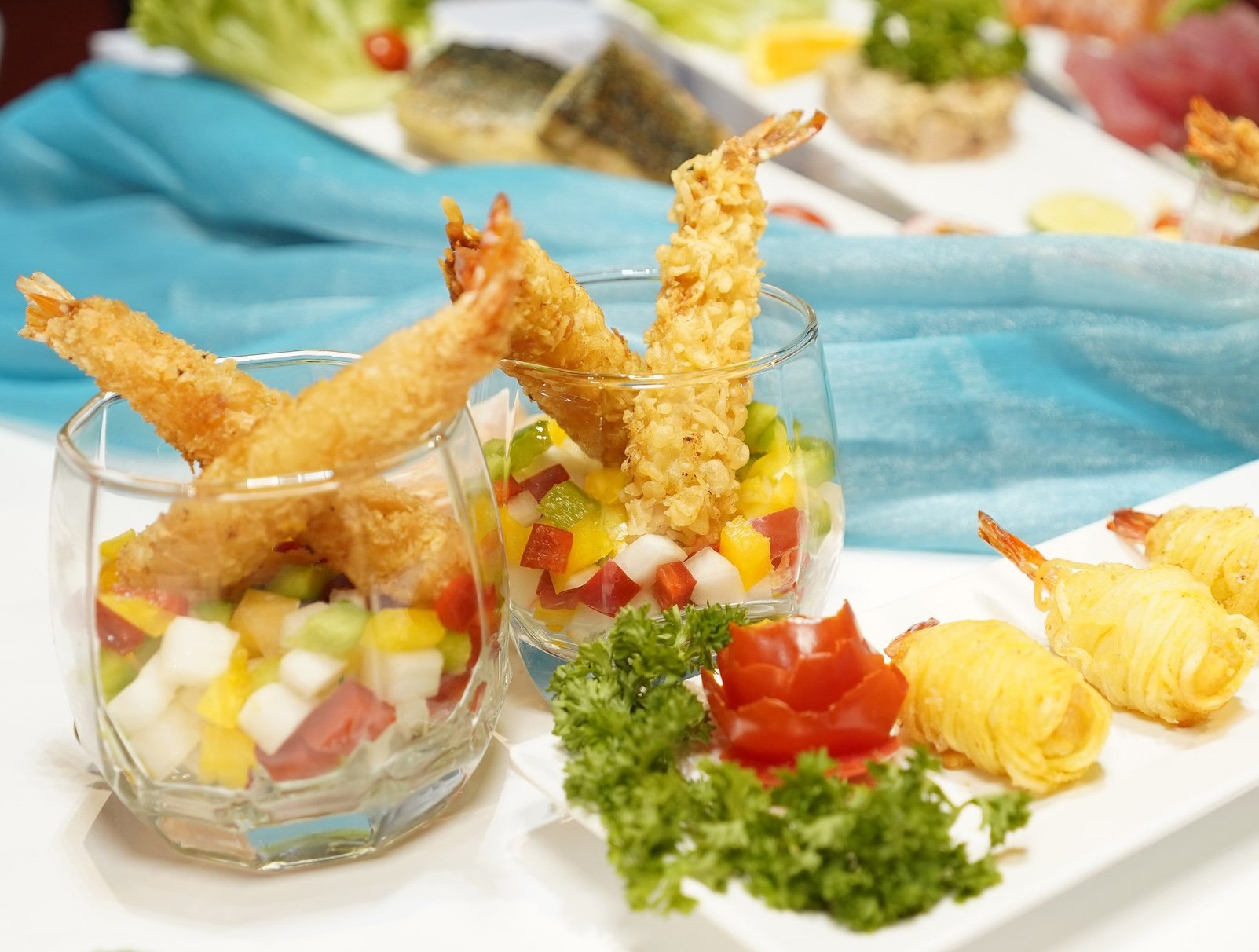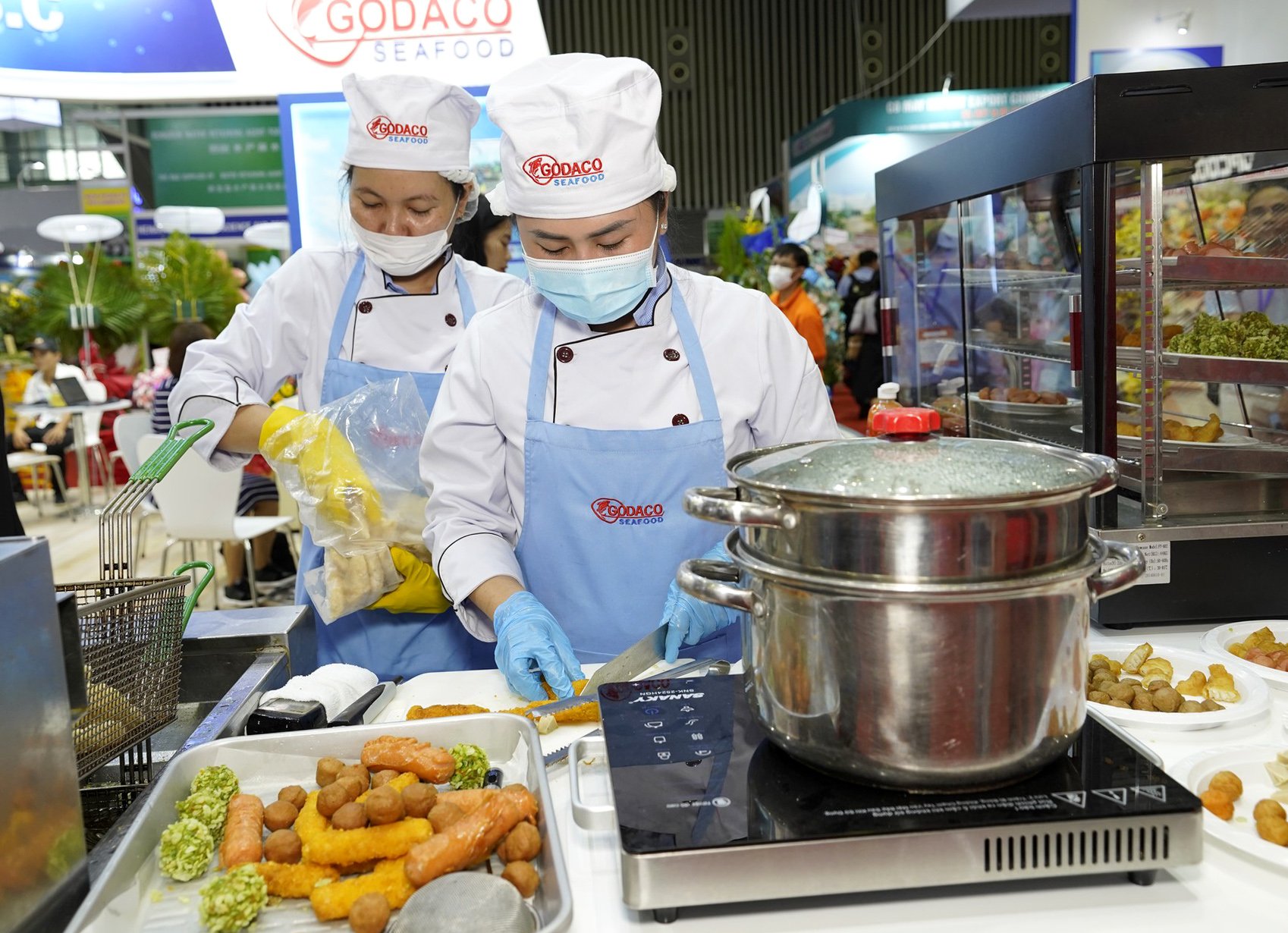June 17, 2025 | 20:58 GMT +7
June 17, 2025 | 20:58 GMT +7
Hotline: 0913.378.918
June 17, 2025 | 20:58 GMT +7
Hotline: 0913.378.918

Examples of deep-processed products - shrimp products at Vietfish 2023. Photo: Son Trang.
Unlike previous editions of the Vietnam Fisheries International Exhibition (Vietfish), at Vietfish 2023, Vietnamese seafood enterprises are not only introducing high-quality raw aquatic products such as shrimp, catfish, tuna, squid, octopus, and offering container or tonnage-based pricing, but they are also setting up areas to showcase a diverse range of food items made from seafood for visitors to taste.
According to the organizers of Vietfish 2023, after the Covid-19 pandemic, consumer trends have been rapidly changing. For seafood, consumers, especially those in large cities and young individuals, are shifting towards canned, ready-to-eat, dried, and frozen seafood products.
Furthermore, the global economic downturn has led to a decrease in overall seafood demand, posing significant challenges for Vietnam's seafood export. This compels seafood enterprises to explore alternative approaches, from production to promotion and product introduction. At Vietfish 2023, these enterprises have concentrated on promoting and introducing deep-processed seafood products that are convenient, delicious, cost-effective, and environmentally friendly, both domestically and internationally.
Mr. Chiem Tran Quoc Cuong, Head of Business Department at Phat Tien Seafood Company Limited, shared that this year, in addition to traditional catfish products like fillet, portioned cuts, whole fish, and butterfly-cut fish, the company has introduced numerous value-added products such as breaded catfish, portioned cuts with breading, and fried fish cakes. These value-added products have allowed Phat Tien to diversify its catfish offerings and cater to customers seeking deep-processed products.
Mrs. Huynh Thi Ngoc Huyen from Sai Thanh Foods Company evaluated that Vietfish is one of the leading seafood exhibitions in Asia. Participating in Vietfish 2023, Sai Thanh Foods is focused on introducing deep-processed products and "green" products made from familiar seafood species such as whiteleg shrimp, barramundi, tuna, and basa.

Processing deep-processed dishes from seafood to invite customers to try at a booth at Vietfish 2023. Photo: Son Trang.
Going beyond the introduction of deep-processed products, Vietfish 2023 also features dedicated areas for culinary demonstrations, shopping, and tasting seafood products. Attendees had the opportunity to directly experience various models, technologies, and assess the quality of Vietnamese seafood through fresh or pre-processed products at the booths. Vietnamese consumers also had the chance to learn about and enjoy 100% Vietnamese seafood products that meet the highest food safety standards, supplied to 165 countries worldwide.
Mr. Igor Kint, a trader from the Netherlands, shared, "I'm very impressed with Vietnamese seafood due to its diversity, richness, and high nutritional content. In particular, deep-processed products from catfish, shrimp, and squid are very appealing, with flavors that suit consumers".
Deep processing is a strength of Vietnam's seafood industry. Dr. Ho Quoc Luc, former Chairman of VASEP, mentioned that in terms of seafood processing, Vietnam is on par with Thailand at the highest level. Therefore, despite a significant decrease in seafood exports this year, in the segment of deep-processed products, Vietnam still holds the highest market share in many markets.
Deep-processed products help Vietnam's seafood industry enhance its competitive ability against other major exporting countries that have abundant and cheap raw materials (such as India and Ecuador, which are strong in raw shrimp with low costs and high output). Deep processing also helps Vietnam's seafood penetrate and establish a presence in demanding markets like Japan, South Korea, the United States, the EU and more.
By investing in deep processing, Vietnam can refine its seafood offerings into value-added products that cater to the evolving preferences of global consumers. This transition from raw seafood to refined, ready-to-consume delicacies amplifies Vietnam's market presence and positions it as a sought-after supplier for premium seafood products. This strategic shift allows the country to sidestep the pitfalls of being a mere raw material provider and transforms it into a sophisticated player capable of meeting the discerning tastes and preferences of diverse international markets.
The process of deep processing also involves innovation and diversification of products. This means moving beyond traditional offerings and creating an array of value-added seafood products that cater to various culinary preferences and lifestyles. Whether it's ready-to-cook shrimp skewers, pre-marinated squid rings, or premium frozen seafood medleys, the versatility offered by deep processing opens doors to new market segments and expands the reach of Vietnamese seafood products to a broader customer base.
In essence, deep processing is a strategic leap for Vietnam's seafood industry, transforming it from a commodity-driven market to a sophisticated player that not only competes but excels in global seafood trade. This approach empowers the nation to redefine its position, engage discerning consumers, and carve a niche in the highly competitive and diverse international seafood landscape.
Translated by Nguyen Hai Long
/2025/06/17/3942-2-143243_548.jpg)
(VAN) Recently, in Sweden, the Secretary of the Binh Dinh Provincial Party Committee presented the Investment Registration Certificate for the 'Polyester Fabric Recycling Complex' project to SYRE Impact-AB Company.
/2025/06/12/3721-2-202745_83.jpg)
(VAN) TH made an impression at Seoul Food 2025 with its line of natural beverages, paving the way for Vietnamese food products to enter the South Korean market.

(VAN) Soc Trang's success in rice exports stems from a strategy of developing fragrant and specialty rice cultivation areas and standardizing production toward low-emission practices.
/2025/06/11/1311-5-120811_839.jpg)
(VAN) The pig farming industry is facing the challenge of comprehensive restructuring to meet requirements for quality, safety, traceability, and market expansion both domestically and for export.

(VAN) Vietnam considers participating in ALGROALBA in order to expand agricultural production, coordinate the assessment and effective exploitation potential land.
/2025/06/05/5314-1-184727_407.jpg)
(VAN) From seemingly worthless fish scales and skin, enzymes and lactic ferments can transform by-products into peptides, opening a sustainable, effective business direction and elevating Vietnamese seafood.

(VAN) TTC AgriS and IFC signed a strategic partnership to develop a sustainable agricultural value chain, aiming to achieve the Net Zero target by 2035.